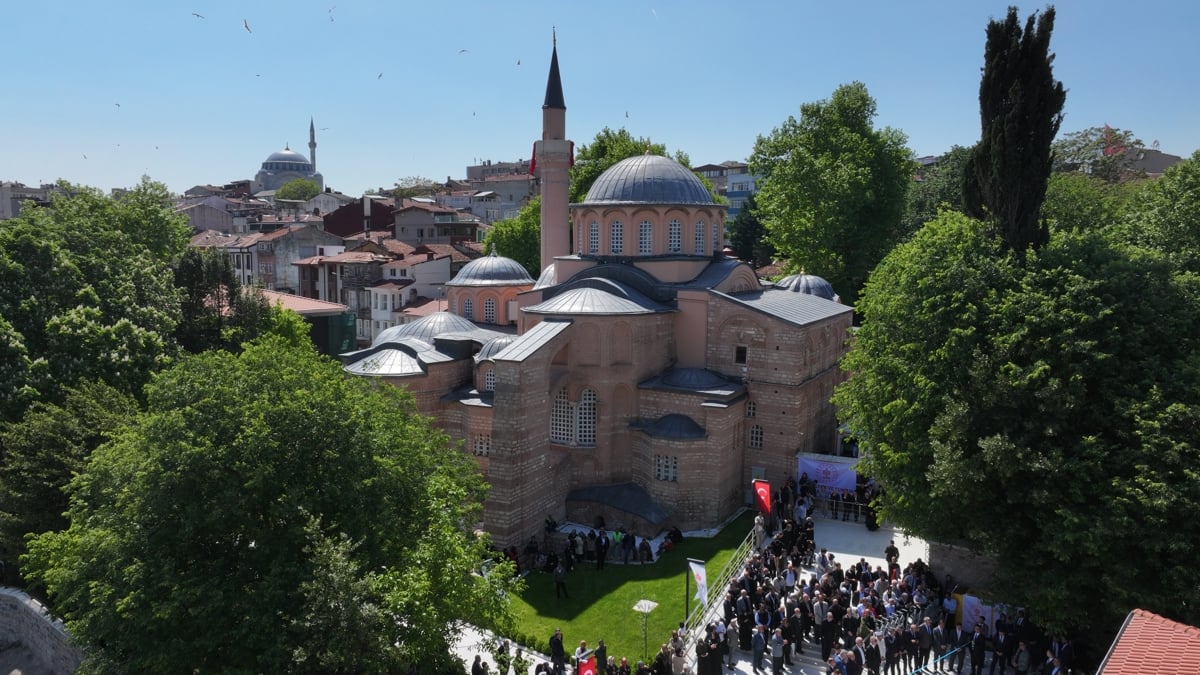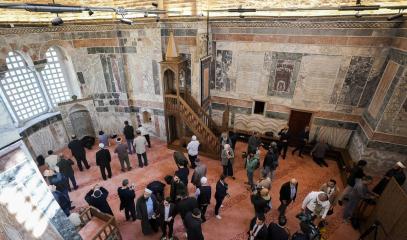The Sultan's basilicas: after St Sophia, Chora also reopens as a mosque
The building is accessible to the public and the faithful after the official inauguration ceremony. The former Christian place of worship was converted by presidential decree in August 2020. President Erdogan extols the thousands of 'ancestral heritage sites' to which he would 'breathe new life', but makes no mention of its origin as a basilica.
Istanbul (AsiaNews) - The former Christian basilica (later converted into a museum) of Chora, a historic structure in Istanbul at the center of a religious political controversy along the lines of what happened with Hagia Sophia, has reopened in recent days as a mosque with an official ceremony of inauguration.
The centuries-old building now owned by the General Directorate of Foundations, a government body that manages and controls the waqfs dating back to the Ottoman Empire and which still exist today, was converted from a museum to a Muslim place of worship with a presidential decree in August 2020.
The centuries-old structure underwent restoration work after remaining open for worship for a short period. Originally built as a church at the time of the Byzantine Empire, then converted into a mosque under the Ottoman Empire, Chora was and still is a symbol of the cultural richness and artistic heritage of the economic and commercial capital of Turkey.
The building, known for its beautiful mosaics and frescoes, was first built as a monastery in 534 during the reign of Emperor Justinian I and has undergone numerous renovations over the centuries.
The decision to convert Chora into a mosque came shortly after a similar transformation of the iconic Hagia Sophia, which was also transformed into a museum during the secularization efforts of the early years of the Republic in the early 1900s under Mustafa Kemal Atatürk.
The reopening of Chora as a mosque is part of a broader political-religious initiative by the government and President Recep Tayyip Erdogan, which involves the restoration and reopening of 201 historic structures on the occasion of Foundations Week.
During a ceremony at the Presidential Complex, the head of state highlighted the importance of these restorations, stating: “Over the past 21 years we have brought back to life 5,500 ancestral heritage sites within our country and in the geographical territory of our motherland ”.
No mention, on the other hand, of the fact that the mosque, once a museum, was originally born as a Christian basilica and was the subject of a forced change of use.
Located in the Edirnekapı neighborhood, in the Fatih district of Istanbul, the “Chora Mosque” is the result of restorations carried out during the Ottoman era and in the second half of the 20th century.
In 1511, the structure was transformed into a mosque by Atik Ali Pasha, grand vizier of Sultan Bayezid II, and became known as “Atik Ali Pasha Mosque” or “Chora (Kariye) Mosque”. During this period, the mosaics and frescoes of the original church were plastered over.
Freedom of worship is guaranteed in Turkey, however, in the last 20 years there have been violations of religious practice, changes of use of former Christian basilicas and confessional bloodshed such as the murder of Fr Andrea Santoro in 2006 and Mgr Luigi Padovese in 2010.
In particular, the conversion into mosques of the ancient Christian basilicas - then museums in the early 20th century under Ataturk - of Hagia Sophia and Chora is part of the nationalist and Islamic policy imposed by Erdogan to hide the economic crisis and maintain power.
Following the decree sanctioning their transformation, the Muslim authorities covered with a white curtain the images of Jesus, frescoes and icons that testify to the Christian roots of Hagia Sophia, a thousand-year-old structure dedicated to the wisdom of God and dating back to the sixth century. The transformation of the two buildings - Unesco World Heritage Sites - took place in 2020 in the first phase of the Covid-19 pandemic, within a political-religious dispute that crossed national borders.








.png)










